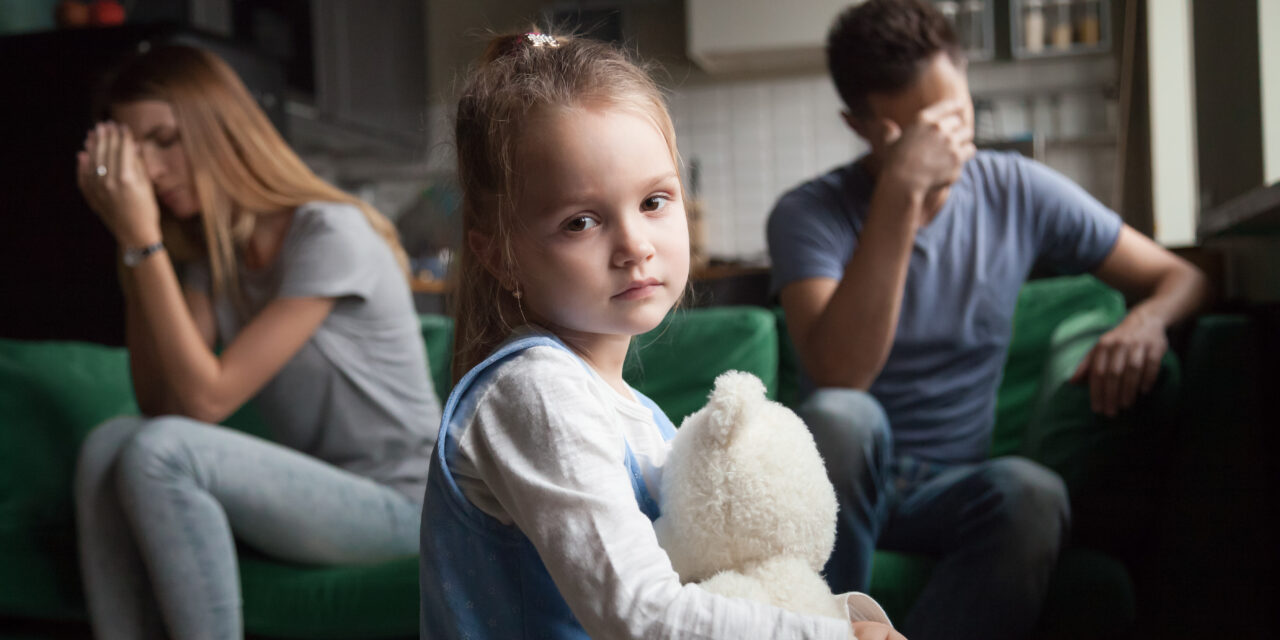Divorce may be a challenging endeavor for any couple, but it can be an equally traumatic experience for children.
Seeing your parents’ marriage end can feel like a downward spiral at any age. Kids will go through various emotions, including anger, guilt, and shock. And the truth is, you won’t know what they are experiencing until you start the conversation.
Ther are ways to soften the blow for your children and make these difficult conversations less overwhelming for your family. It starts with communication and family discussions.
Plan what to Say — and when.
Like any big speech you deliver in life, it’s best to plan what to say to your children — together, if possible. Include as many positives as you can in the conversation, such as:
• Mommy and Daddy love you and will always be there for you.
• We will be happier this way.
• You will have two places to call home.
• It is not your fault.
Remember, impulsive comments can hurt your kids more. Also, choose a time to break the news. Give them enough time to process their feelings. Avoid delivering the news on holidays, school days, or special family occasions like birthdays.
Share a clear and simple version of the truth.
Your kids have the right to know why your marriage is ending, but lengthy reasons might confuse them, especially if they are younger. Instead, choose a simple version of the truth, such as, “We can’t get along anymore.”
Remind your kids that even if parents and kids don’t always get along, they never stop loving each other. Let them know that you will continue working together as co-parents because their happiness and well-being will always be the family’s top priority.
Focus on a non-blaming narrative
It’s easy to blame a partner and claim a divorce is one person’s fault. It may be tempting to overshare by saying, “Dad had an affair,” or “Mom has a gambling problem.” But, doing so will make your kids feel as though they have to choose sides.
Using the word “we” can change the mood. Choose phrases like, “We want to stop arguing,” or “We both agree that being apart is the best way for all of us to be happy.”
Inform the children about what will change and what will stay the same.
One of the most crucial points in talking about divorce is telling your kids how it will impact them. Younger kids still have a self-centric mindset, so they will spend a lot of time thinking about how your separation will affect their daily lives.
If you can, discuss the following details:
• Where the kids will live and when they will see each parent.
• What will stay the same (school, activities, etc.,) and what will change.
• Any special circumstances that are unique to your family.
Be honest about the decisions you’ve finalized and those you haven’t. End this part of the conversation by saying that your love for them will never change and that you will both be present for all their milestones.
Remind them that this is not their fault.
Every chance you get, remind your kids that the end of your marriage is not their fault. Let them know that separation is an adult decision and that there was nothing they could have done to cause or avoid the circumstances. Reinforce the fact you’ve experienced challenges as a couple and that the kids are not responsible for fixing them.
Tell them what living arrangements have been made.
Another critical factor to share is what living arrangements have been made. Perhaps one parent is leaving the home, or there is a need for everyone to move. Once you’ve decide on this component, tell the children immediately. Let them know where you or your spouse will move and when they will see the departing parent. Reassure your children that they will maintain healthy relationships with both parents — just under two roofs.
Welcome their questions.
Lastly, be open to your childrens’ questions. Some children might be too shocked to talk right away, but others will speak their minds. Be as honest as possible with your answers.
If you don’t have all the answers, let them know you will figure things out. Tell them they can ask you anything about the divorce at any time. Doing so will encourage them to talk to you about their feelings toward your separation.
1. Plan What To Say — and When
Like any big speech you have to make in life, it’s best to plan what to say to your children — together, if possible. Include as many positives as you can in the conversation, such as:
- Mommy and Daddy love you and will always be there for you.
- We will be happier this way.
- You will have two places to call home.
- It is not your fault.
- There was nothing you could have done to make Mommy and Daddy stay together.
Remember, blurting out impulsively can only hurt your kids more. Also, choose a time to break the news. Give them enough time to process their feelings. Don’t do it on holidays, school days, or special family occasions like birthdays.
2. Share a Clear and Simple Version of the Truth
Your kids have the right to know why your marriage is ending, but lengthy reasons might confuse them. Go for a clear and simple version of the truth, such as, “We can’t get along anymore.”
However, remind your kids that even if parents and kids don’t always get along, they will never stop loving each other or get divorced. Let them know that you will give coparenting a shot and that their happiness and well-being will always be the family’s top priority.
3. Focus on a Non-blaming Narrative
It’s easy to put the blame on a partner and tell the kids whose fault the divorce is. You may be tempted to say, “Dad had an affair,” or “Mom has a gambling problem.” However, doing so will make your kids feel caught in the middle, as if they have to choose sides.
Using the word we can change the mood. Choose phrasings like, “We aren’t happy together,” or “We want to stop arguing.”
4. Inform the Kids About What Will Change and What Will Stay the Same
One of the most crucial parts of talking about divorce is telling your kids how it will impact them. Younger kids still have a self-centric mindset, so they will think about how your separation will affect their daily lives.
If you can, discuss the following in detail:
- Where the kids will live
- Who will take care of the children
- What changes will happen, including school or weekend schedules
Be honest about the decisions you’ve finalized and those you haven’t discussed yet. End this part of the conversation by saying that your love for them will never change and that you will be present for all their milestones.
5. Remind the Kids That the Divorce Is Not Their Fault
Every chance you get, remind your kids that the end of your marriage is not their fault. Let them know that the separation is an adult decision and that there was nothing they could have done to keep you together. Reinforce the idea that you were having problems as a couple and that the kids are not responsible for fixing them.
6. Tell the Kids Which Parent Will Leave the Home
Another critical factor to share with the kids is which parent will leave home. Once you decide on this component, tell the kids immediately. Let them know where you or your spouse will move and when they will see the departing parent. Reassure your children that they will maintain healthy relationships with both parents — but under two roofs this time.
7. Welcome Questions
Lastly, be open to your kids’ questions. Some children might be too shocked to talk right away, but others will speak their minds. Be as honest as possible with your answers.
If you don’t have all the answers just yet, let them know you will figure things out. Tell them that they can ask you anything about the divorce at any time. Doing so will encourage them to talk to you about their feelings toward your separation.
Need More Parenting Tips?
Divorce is not an easy subject — especially for the kids. However, talking about it is the first logical step to healing as a family. It might take some time for your kids to accept the news, but you can trust that they will feel better with time.
For more parenting tips, check out our website. You will find several resources on divorce that will help you and your family cope during this difficult time.
















